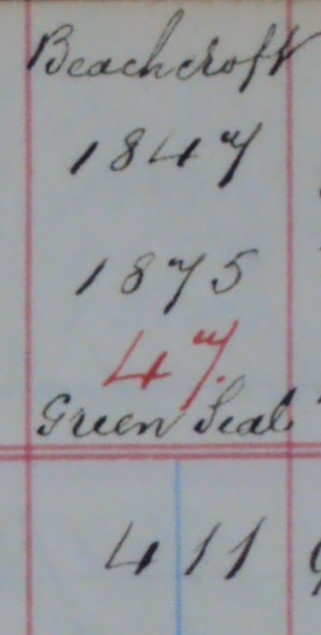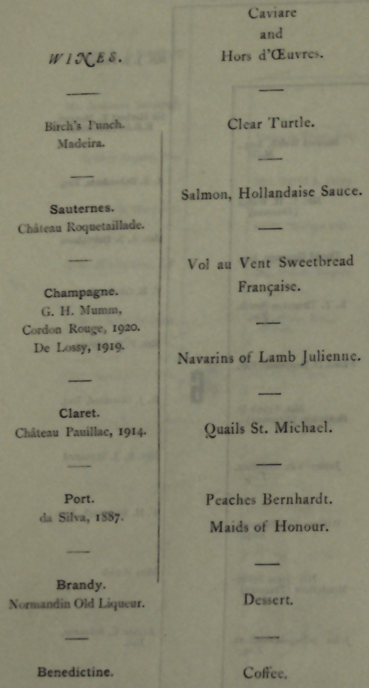You can find the book at Project Gutenberg:
http://www.gutenberg.org/ebooks/1684
Here is the chapter you mentioned:
CHAPTER XX
AN AGED AND A GREAT WINE
...
"I am going down to my inner cellar."
"An inner cellar!" exclaimed the doctor.
"Sacred from the butler. It is interdicted to Stoneman. Shall I offer
myself as guide to you? My cellars are worth a visit."
"Cellars are not catacombs. They are, if rightly constructed, rightly
considered, cloisters, where the bottle meditates on joys to bestow, not
on dust misused! Have you anything great?"
"A wine aged ninety."
"Is it associated with your pedigree that you pronounce the age with
such assurance?"
"My grandfather inherited it."
"Your grandfather, Sir Willoughby, had meritorious offspring, not to
speak of generous progenitors. What would have happened had it fallen
into the female line! I shall be glad to accompany you. Port? Hermitage?"
"Port."
"Ah! We are in England!"
"There will just be time," said Sir Willoughby, inducing Dr. Middleton
to step out.
A chirrup was in the reverend doctor's tone: "Hocks, too, have compassed
age. I have tasted senior Hocks. Their flavours are as a brook of many
voices; they have depth also. Senatorial Port! we say. We cannot say
that of any other wine. Port is deep-sea deep. It is in its flavour
deep; mark the difference. It is like a classic tragedy, organic in
conception. An ancient Hermitage has the light of the antique; the merit
that it can grow to an extreme old age; a merit. Neither of Hermitage
nor of Hock can you say that it is the blood of those long years,
retaining the strength of youth with the wisdom of age. To Port for
that! Port is our noblest legacy! Observe, I do not compare the wines; I
distinguish the qualities. Let them live together for our enrichment;
they are not rivals like the Idaean Three. Were they rivals, a fourth
would challenge them. Burgundy has great genius. It does wonders within
its period; it does all except to keep up in the race; it is
short-lived. An aged Burgundy runs with a beardless Port. I cherish the
fancy that Port speaks the sentences of wisdom, Burgundy sings the
inspired Ode. Or put it, that Port is the Homeric hexameter, Burgundy
the pindaric dithyramb. What do you say?"
"The comparison is excellent, sir."
"The distinction, you would remark. Pindar astounds. But his elder
brings us the more sustaining cup. One is a fountain of prodigious
ascent. One is the unsounded purple sea of marching billows."
"A very fine distinction."
"I conceive you to be now commending the similes. They pertain to the
time of the first critics of those poets. Touch the Greeks, and you can
nothing new; all has been said: 'Graiis . . . praeter, laudem nullius
avaris.' Genius dedicated to Fame is immortal. We, sir, dedicate genius
to the cloacaline floods. We do not address the unforgetting gods, but
the popular stomach."
Sir Willoughby was patient. He was about as accordantly coupled with Dr.
Middleton in discourse as a drum duetting with a bass-viol; and when he
struck in he received correction from the paedagogue-instrument. If he
thumped affirmative or negative, he was wrong. However, he knew scholars
to be an unmannered species; and the doctor's learnedness would be a
subject to dilate on.
In the cellar, it was the turn for the drum. Dr. Middleton was
tongue-tied there. Sir Willoughby gave the history of his wine in heads
of chapters; whence it came to the family originally, and how it had
come down to him in the quantity to be seen. "Curiously, my grandfather,
who inherited it, was a water-drinker. My father died early."
"Indeed! Dear me!" the doctor ejaculated in astonishment and condolence.
The former glanced at the contrariety of man, the latter embraced his
melancholy destiny.
He was impressed with respect for the family. This cool vaulted cellar,
and the central square block, or enceinte, where the thick darkness was
not penetrated by the intruding lamp, but rather took it as an eye, bore
witness to forethoughtful practical solidity in the man who had built
the house on such foundations. A house having a great wine stored below
lives in our imaginations as a joyful house, fast and splendidly rooted
in the soil. And imagination has a place for the heir of the house. His
grandfather a water-drinker, his father dying early, present
circumstances to us arguing predestination to an illustrious heirship
and career. Dr Middleton's musings were coloured by the friendly vision
of glasses of the great wine; his mind was festive; it pleased him, and
he chose to indulge in his whimsical, robustious, grandiose-airy style
of thinking: from which the festive mind will sometimes take a certain
print that we cannot obliterate immediately. Expectation is grateful,
you know; in the mood of gratitude we are waxen. And he was a
self-humouring gentleman.
He liked Sir Willoughby's tone in ordering the servant at his heels to
take up "those two bottles": it prescribed, without overdoing it, a
proper amount of caution, and it named an agreeable number.
Watching the man's hand keenly, he said:
"But here is the misfortune of a thing super-excellent: not more than
one in twenty will do it justice."
Sir Willoughby replied: "Very true, sir; and I think we may pass over
the nineteen."
"Women, for example; and most men."
"This wine would be a scaled book to them."
"I believe it would. It would be a grievous waste."
"Vernon is a claret man; and so is Horace De Craye. They are both below
the mark of this wine. They will join the ladies. Perhaps you and I,
sir, might remain together."
"With the utmost good-will on my part."
"I am anxious for your verdict, sir."
"You shall have it, sir, and not out of harmony with the chorus
preceding me, I can predict. Cool, not frigid." Dr. Middleton summed the
attributes of the cellar on quitting it. "North side and South. No musty
damp. A pure air. Everything requisite. One might lie down one's self
and keep sweet here."
Of all our venerable British of the two Isles professing a suckling
attachment to an ancient port-wine, lawyer, doctor, squire, rosy
admiral, city merchant, the classic scholar is he whose blood is most
nuptial to the webbed bottle. The reason must be, that he is full of the
old poets. He has their spirit to sing with, and the best that Time has
done on earth to feed it. He may also perceive a resemblance in the wine
to the studious mind, which is the obverse of our mortality, and throws
off acids and crusty particles in the piling of the years, until it is
fulgent by clarity. Port hymns to his conservatism. It is magical: at
one sip he is off swimming in the purple flood of the ever-youthful antique.
By comparison, then, the enjoyment of others is brutish; they have not
the soul for it; but he is worthy of the wine, as are poets of Beauty.
In truth, these should be severally apportioned to them, scholar and
poet, as his own good thing. Let it be so.
Meanwhile Dr. Middleton sipped.
After the departure of the ladies, Sir Willoughby had practised a
studied curtness upon Vernon and Horace.
"You drink claret," he remarked to them, passing it round. "Port, I
think, Doctor Middleton? The wine before you may serve for a preface. We
shall have your wine in five minutes."
The claret jug empty, Sir Willoughby offered to send for more. De Craye
was languid over the question. Vernon rose from the table.
"We have a bottle of Doctor Middleton's port coming in," Willoughby said
to him.
"Mine, you call it?" cried the doctor.
"It's a royal wine, that won't suffer sharing," said Vernon.
"We'll be with you, if you go into the billiard-room, Vernon."
"I shall hurry my drinking of good wine for no man," said the Rev.
Doctor.
"Horace?"
"I'm beneath it, ephemeral, Willoughby. I am going to the ladies."
Vernon and De Craye retired upon the arrival of the wine; and Dr.
Middleton sipped. He sipped and looked at the owner of it.
"Some thirty dozen?" he said.
"Fifty."
The doctor nodded humbly.
"I shall remember, sir," his host addressed him, "whenever I have the
honour of entertaining you, I am cellarer of that wine."
The Rev. Doctor set down his glass. "You have, sir, in some sense, an
enviable post. It is a responsible one, if that be a blessing. On you it
devolves to retard the day of the last dozen."
"Your opinion of the wine is favourable, sir?"
"I will say this: shallow souls run to rhapsody: I will say, that I am
consoled for not having lived ninety years back, or at any period but
the present, by this one glass of your ancestral wine."
"I am careful of it," Sir Willoughby said, modestly; "still its natural
destination is to those who can appreciate it. You do, sir."
"Still my good friend, still! It is a charge; it is a possession, but
part in trusteeship. Though we cannot declare it an entailed estate, our
consciences are in some sort pledged that it shall be a succession not
too considerably diminished."
"You will not object to drink it, sir, to the health of your
grandchildren. And may you live to toast them in it on their marriage-day!"
"You colour the idea of a prolonged existence in seductive hues. Ha!
It is a wine for Tithonus. This wine would speed him to the rosy
Morning aha!"
"I will undertake to sit you through it up to morning," said Sir
Willoughby, innocent of the Bacchic nuptiality of the allusion.
Dr Middleton eyed the decanter. There is a grief in gladness, for a
premonition of our mortal state. The amount of wine in the decanter did
not promise to sustain the starry roof of night and greet the dawn. "Old
wine, my friend, denies us the full bottle!"
"Another bottle is to follow."
"No!"
"It is ordered."
"I protest."
"It is uncorked."
"I entreat."
"It is decanted."
"I submit. But, mark, it must be honest partnership. You are my worthy
host, sir, on that stipulation. Note the superiority of wine over
Venus! I may say, the magnanimity of wine; our jealousy turns on him
that will not share! But the corks, Willoughby. The corks excite my
amazement."
"The corking is examined at regular intervals. I remember the occurrence
in my father's time. I have seen to it once."
"It must be perilous as an operation for tracheotomy; which I should
assume it to resemble in surgical skill and firmness of hand, not to
mention the imminent gasp of the patient."




